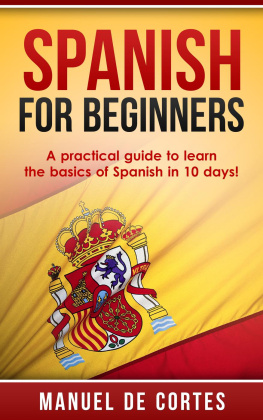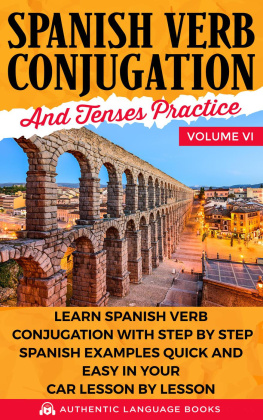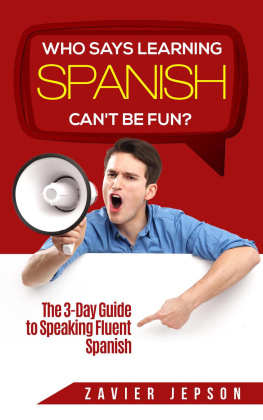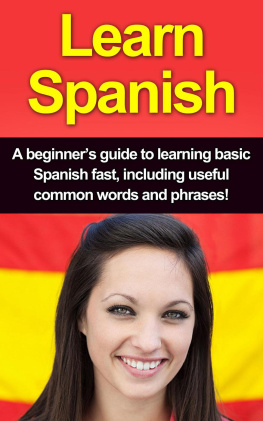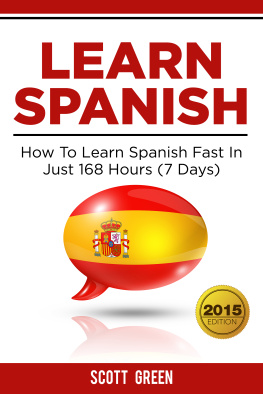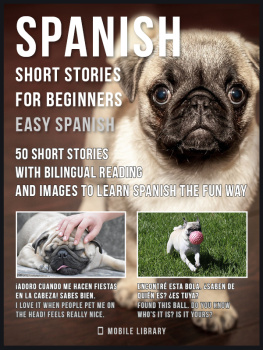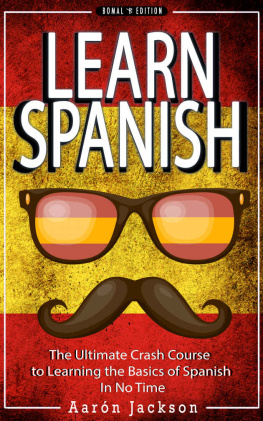Learn Spanish
6 BOOKS IN 1:
Learn Spanish for Beginners
Spanish Short Stories for Beginners
Learn Spanish for intermediate users
Learn Spanish for Advanced Users
Spanish Short Stories
Speak Spanish
The Ultimate Spanish Language Books collection to Learn Starting from Zero, Have Fun and Become Fluent like a Native Speaker
Copyright 2020 by Fern ndez Language Institute - All rights reserved.
The content contained within this book may not be reproduced, duplicated or transmitted without direct written permission from the author or the publisher.
Under no circumstances will any blame or legal responsibility be held against the publisher, or author, for any damages, reparation, or monetary loss due to the information contained within this book. Either directly or indirectly.
Legal Notice:
This book is copyright protected. This book is only for personal use. You cannot amend, distribute, sell, use, quote or paraphrase any part, or the content within this book, without the consent of the author or publisher.
Disclaimer Notice:
Please note the information contained within this document is for educational and entertainment purposes only. All effort has been executed to present accurate, up to date, and reliable, complete information. No warranties of any kind are declared or implied. Readers acknowledge that the author is not engaging in the rendering of legal, financial, medical or professional advice. The content within this book has been derived from various sources. Please consult a licensed professional before attempting any techniques outlined in this book.
By reading this document, the reader agrees that under no circumstances is the author responsible for any losses, direct or indirect, which are incurred as a result of the use of information contained within this document, including, but not limited to, errors, omissions, or inaccuracies.
TABLE OF CONTENTS
Learn Spanish for Beginners
Spanish Short Stories for Beginners
Learn Spanish
for Intermediate Users
Learn Spanish
for Advanced Users
Spanish Short Stories
Speak Spanish
Learn Spanish
for Beginners
The complete beginners guide to speak Spanish in just 7 days starting from zero. Includes the most common Spanish words and phrases.
Introduction
Spanish has a great many salutations and the one who you use depends upon a number of variables, of course.
Theres, of course, the generally used hola (oh-la). This just means hello in English. The etymology of the word hola is deeply interesting, but its of course beyond the scope of this book.
Anyhow, there are also the greetings which have to do with the time of day. There is buenos das (bwey-nohs di-ahs). This means literally good morning and is one of the more common Spanish greetings aside from hola. There also is buenas tardes (bwey-nahs tar-dehs), which means good evening. This isnt used as often as a conventional salutation, though it certainly can be used with no problem. The last one in this category is buenas noches (bwey-nahs no-chess). This means literally good night and its usage is unwavering. You generally will only use this as a goodbye to somebody for the night is you know that you wont be seeing them again that night, if that is the case you should use the word " adis " first; for not to confuse it with a greetings.
Lastly, there is muy buenos . (moy bwey-nohs). This is a very general greeting as compared to other ones such as buenos das and hola. You can use this greeting at pretty much any time of day whenever you indicate the corresponding time of day, after using this words days, evenings and nights in the end.
So after all of that, were now officially in the conversation, engaging in the nigh professional art of small talk. These small talk sessions generally almost always start by asking somebody how they are or how theyre doing. There are a ton of ways to ask this sort of question in Spanish.
Firstly, there are the more formal routes to be taken. To simply ask How are you?, you first need to think about who youre talking to. Are you speaking to somebody your age? Younger? Older? Have you met them before? Then you need to pick either the informal or the formal way to ask based upon your evaluations. The informal way to ask is to simply Cmo estas ? (co-moh es-tahs), meaning in a literal sense how are you?. The formal way is just the usted inversion of the prior question: Cmo est usted ? (co-moh es-ta oos-ted). This means the same thing as before, but this version is of course to be reserved for meeting new people or for talking to people who are in a position of superiority.
On top of that, there are more casual ways to ask. You could say hows it going?: Cmo te va ? (co-moh teh va)
Simply asking whats up? is certainly not out of the question: Qu tal ? (kay tall)
Neither would be asking something along the lines of whats happening?- Qu pasa ? (kay pah-sah) - or How have you been?: Cmo has ido ? (co-moh ahs ee-do)
All in all, there are a ton of ways to ask somebody exactly how theyre doing in Spanish. There are likewise a huge number of ways in which you could respond to this very question. Note that being in a foreign country or situation means that the culture is inevitably different; in America and England, when we ask how are you?, we do so as a courtesy and generally not in the seeking of a very well-thought out response or any sort of genuine emotional discourse. Certain other countries arent like this, and if you ask how they are, theyll tell you how they are.
But for all intents and purposes, you may or may not give a very deep response. Should you choose to go with a more standard response, there are a number of different ways in which you could phrase it.
You could start with the quintessential bien, gracias (byen, grah-see-as) which means simply well/fine, thank you. You could also opt for very well by saying muy bien (moy byen). You could insert a certain amount of nihilistic apathy into your conversation by saying Como siempre which technically means like always but carries the weight more like I am as I always seem to be. If youre not feeling well, you can say that youre sick by saying either estoy enfermo or estoy enferma depending upon your gender, men saying the first and women saying the second. And if youre not doing too well, you could say ms o menos (moss oh men-ohs) meaning so-so, or you could say mal which translates to simply badly or poorly.
Then, there are multiple different ways in which you could say goodbye. There are a few generally used ones, and a few which are geared towards more special purposes.
The two general purpose ones that you need to know are adi s and chao . Both are common enough that Im not going to tell you how to pronounce them. If youre on the up, you very well may notice a parallel between Spanish and neighboring Romance language Italian here, where ciao is used as a form of goodbye. Both of these are acceptable ways to say goodbye. This may also vary depending on the intimacy of the conversation.
If youll be seeing the person soon, you could tell them Hasta pronto (ahs-tah pronto). But when I say soon, I mean soon. This is one place where the common conception of soon as used in the U.S. or Britain generally doesnt cut it in other timetables.
If youre just going to see them at a later point in time, you could say Hasta luego (ahs-tah lwey-go). This could imply a lack of certainty about when youll meet again, however. It, as many things do, ultimately depends upon the context in which its used.
The last one were going to talk about here is Hasta la vista (ahs-tah lah vees-tah, but honestly, who doesnt know how to pronounce this one thanks to Hollywood?). This phrase means essentially Until next time or untill we meet again. This one too can communicate a lack of certainty dependent upon the context.



